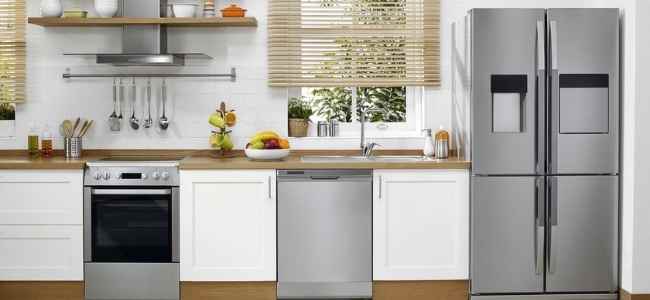Most people have a challenge in determining which of their appliances need replacement, and when is the right time to replace the appliances. Generally, our household appliances have an average lifespan of 15 – 25 years. However, this depends on the quality of your appliances, how you maintain them, as well as how you use them.
For instance, if you run an average of two loads of laundry every week, chances are your washer and dryer will last longer than that of a family of four. The reason behind this is that you will not be overworking your washer and dryer since you have a light load to clean.
When planning to replace your appliances, the first thing to consider is to determine the current performance of your appliances. Here, you must check whether your appliances require regular repairs, thus costing you a lot of money. Also, you must consider the safety of the users or your home in case the appliance breaks down.
A faulty washing machine or dishwasher can cause major water damage to your home. Also, if your appliances are old, there is a chance that they can cause a fire in your house. On the other hand, if your oven isn’t heating well it can lead to poorly cooked meals—and this is the last thing that any homeowner desires.
Although replacing your appliances might not be a complete home remodeling, it’s a costly project. Therefore, you should take your time to think about it before proceeding. The last thing you’d want is to purchase appliances that don’t add any value to your home.
In this post, we’ve listed the top 5 tips to help you determine when to replace your appliances. Read on for more information.
If you are looking for energy-efficient appliances
According to the technicians at Hartman’s Appliance Repair, high energy costs are the leading factor why most people opt to replace their appliances. So, if you have old appliances, with a lower energy star rating compared to newer models, it’s time to replace them. While this can be costly at the onset, it can save you a lot of money in the future on your energy bills.
Modern appliances have an EnergyGuide label attached to them, which estimates the average cost of operating the appliance. Apart from that, appliances with an Energy Star label mean that these appliances have met the international standard of energy efficiency, which was created by the U.S. Environmental Protection Agency (EPA) and the Department of Energy. According to the U.S. Department of Energy, appliances with an Energy Star rating are 20% less energy efficient compared to standard appliances.
Age of the appliances
As said earlier, the average lifespan of appliances is between 15 – 25 years, even though this depends on their maintenance and usage. So, when considering replacing your appliances, you need to note their age. In addition, you must also consider whether or not their warranty is valid, and the number of times you’ve had to repair the appliances.
With that said, if your appliance is a few months old, there is a chance that it’s still covered by warranty. So, replacing the appliance at this point might not be a good idea. Besides, even if the warranty is expired, you might need the appliance inspected by a technician before determining if replacement is the right idea.
However, if your appliance keeps on breaking down frequently, it might be the right time to consider replacing it. Please note that those regular repairs can end up costing you more money than what you could have spent when buying a new machine.
If the costs of repair are high
If you find that you are spending more than 50% of the value of your appliances on repairs, it’s time you got a new one. Besides, if appliance repair technicians visit your home regularly to repair your appliances, getting a new appliance will be your best option.
Signs of appliance malfunction
Your appliance might be a few years old, but some signs could be an indication that the appliance is on its last days. For example, if your fridge is noisy, has irregular temperature fluctuations, or causes frosting or condensation to the contents inside, chances are it needs replacement.
Also, if your appliances tend to overheat or have clear signs of wear and tear, just get them. In addition, if the appliance keeps on tripping the circuit breaker now and then, you might need to replace it earlier than expected.
You need to upgrade your appliances
The design of modern appliances makes it easier for them to fit into our contemporary lifestyles. These appliances come with amazing features like programmable functions, which make it easier for us to use the appliances. Some of these appliances have smartphone functionality, meaning you can operate them from any location.
So, if you are looking for appliances that will make your life easier, it’s time to upgrade to modern, smart appliances, which can fit into your busy lifestyle easily.
Bottom Line
There you go. These are the few tips to help you determine when you should replace your appliances. However, you shouldn’t wait until your appliances are on their last days to replace them. Although it might seem a great idea to let your appliances live their lifespan, getting a new appliance can save you a lot of money on energy bills.


